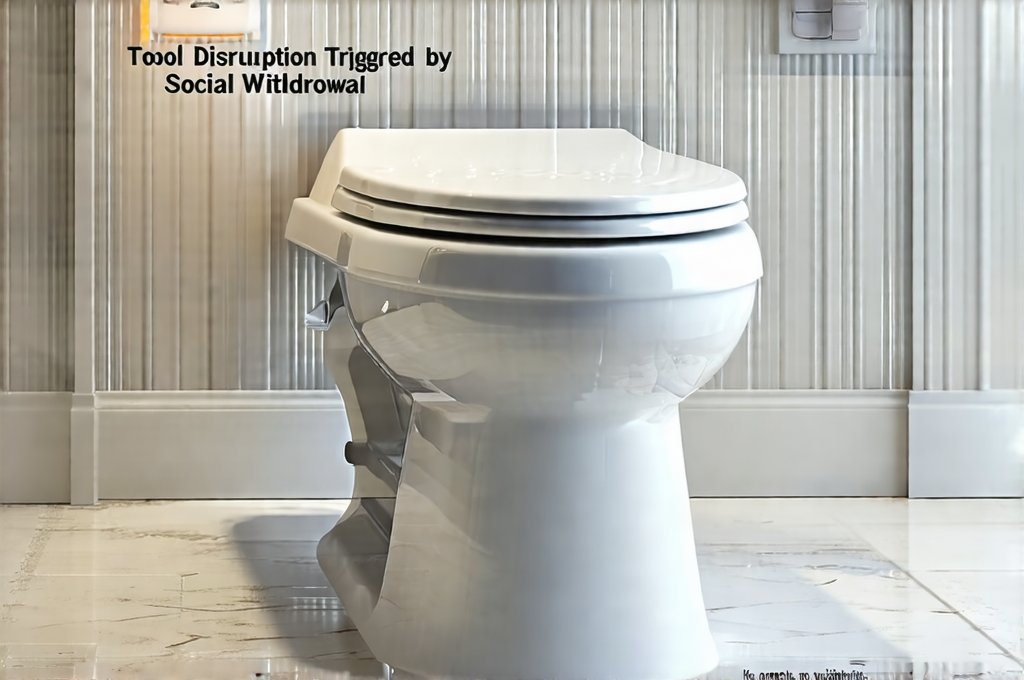The human gut is often described as our ‘second brain’, and for good reason. It’s not merely a digestive system; it’s an incredibly complex ecosystem intimately linked to our mental and emotional wellbeing. This bidirectional relationship, known as the gut-brain axis, means that what happens in our minds profoundly impacts our digestion, and conversely, the health of our gut significantly influences our mood, stress levels, and overall psychological state. Increasingly, research is highlighting a disturbing trend: prolonged periods of social withdrawal can dramatically disrupt this delicate balance, leading to noticeable changes in bowel habits – from constipation and diarrhea to bloating, abdominal pain, and even irritable bowel syndrome (IBS)-like symptoms. This isn’t necessarily a sign of physical illness, but rather a physiological response to the stress and psychological shifts accompanying isolation and reduced social interaction.
The connection stems from several factors. Social interaction provides crucial stimulation for our nervous system, regulates cortisol levels (the ‘stress hormone’), and influences the composition of our gut microbiome – the trillions of bacteria residing in our digestive tract. When we withdraw socially, these processes are disrupted. Chronic stress elevates cortisol, which directly impacts gut motility (how quickly food moves through the digestive system) and permeability (‘leaky gut’). Furthermore, social isolation can lead to changes in dietary habits, reduced physical activity, and increased anxiety – all of which contribute to a less-than-ideal environment for a healthy gut microbiome. The result is often a cascade of digestive symptoms that can significantly impact quality of life. Understanding this interplay is the first step towards addressing these issues and restoring both gastrointestinal and psychological wellbeing. You may also want to explore hidden gut issues revealed by advanced scan layers.
The Neurobiological Pathways Linking Social Withdrawal and Gut Disruption
The intricate link between social withdrawal and stool disruption isn’t simply ‘in your head’, although mental state plays a substantial role. It’s rooted in established neurobiological pathways that govern the gut-brain axis. One primary pathway involves the hypothalamic-pituitary-adrenal (HPA) axis, our body’s central stress response system. – Prolonged social isolation is perceived as a chronic stressor by the brain. – This triggers sustained activation of the HPA axis, leading to consistently elevated cortisol levels. – Cortisol directly impacts gut function in several ways: it can slow down digestion, increase intestinal permeability, and alter the composition of the microbiome. Another crucial pathway involves the vagus nerve, often referred to as the ‘wandering nerve’. This long cranial nerve acts as a direct communication line between the brain and the gut, transmitting signals in both directions. Social interaction stimulates the vagus nerve, promoting healthy digestion and reducing inflammation. Conversely, social isolation can dampen vagal tone – the strength of these nerve signals – leading to impaired gut function and increased susceptibility to digestive problems. Learning about stool bacteria ratios is also useful here.
Beyond cortisol and the vagus nerve, neurotransmitters like serotonin also play a vital role. A significant portion of our body’s serotonin is produced in the gut, and this neurotransmitter is crucial for regulating bowel movements and overall mood. Social interaction stimulates serotonin production, while isolation can lead to decreased levels, contributing to both digestive symptoms and feelings of sadness or anxiety. This creates a vicious cycle: social withdrawal leads to reduced serotonin, which exacerbates digestive issues and further discourages social engagement. It’s important to understand that these pathways are interconnected; they don’t operate in isolation. The combination of hormonal imbalances, impaired nerve function, and neurotransmitter dysregulation explains why social withdrawal can have such a profound impact on gut health. You might find stool testing insights beneficial to explore this further.
The gut microbiome itself is profoundly affected by these changes. A healthy microbiome relies on diversity – a wide range of bacterial species working together to maintain digestive balance. Social isolation often leads to: – Reduced dietary variety (comfort foods become more appealing). – Decreased physical activity, impacting microbial diversity. – Increased stress hormones which can negatively influence gut bacteria populations. This loss of diversity weakens the microbiome’s ability to protect against harmful pathogens and regulate inflammation, further contributing to stool disruption.
Identifying the Symptoms & Recognizing the Pattern
Pinpointing whether stool disruption is specifically linked to social withdrawal can be challenging, as many factors can contribute to digestive issues. However, certain patterns and accompanying symptoms should raise awareness. One key indicator is a clear temporal relationship: did the changes in bowel habits begin or worsen around the time of increased isolation? Look for shifts beyond occasional discomfort; are you experiencing persistent constipation, diarrhea, bloating, abdominal pain, or urgency? These symptoms aren’t necessarily severe, but they are consistent and disruptive. It’s also crucial to differentiate these issues from other potential causes like food intolerances, infections, or underlying medical conditions.
Alongside digestive symptoms, pay attention to accompanying psychological changes. Are you experiencing increased anxiety, sadness, loneliness, or a loss of motivation? Do you find yourself withdrawing further from social situations due to feelings of overwhelm or self-consciousness? These emotional and behavioral changes are strong indicators that social withdrawal is playing a significant role. Consider keeping a journal tracking both your bowel movements and your mood/social activity levels. This can help identify correlations and provide valuable information for understanding the connection. Importantly, avoid self-diagnosing. If symptoms are severe or persistent, it’s essential to consult with a healthcare professional to rule out other potential causes and receive appropriate guidance. Understanding what to expect from comprehensive stool analysis can be helpful too.
Dietary & Lifestyle Adjustments for Gut Support
Addressing stool disruption triggered by social withdrawal requires a holistic approach that focuses on both gut health and psychological wellbeing. Dietary changes can play a significant role in restoring balance. – Increase fiber intake: Fiber promotes healthy bowel movements and supports the growth of beneficial gut bacteria. Include plenty of fruits, vegetables, whole grains, and legumes in your diet. – Consider fermented foods: Foods like yogurt, kefir, sauerkraut, and kimchi contain probiotics – live microorganisms that can help repopulate the gut with beneficial bacteria. – Reduce processed foods, sugar, and artificial sweeteners: These can disrupt the microbiome and exacerbate digestive symptoms. Hydration is also essential; aim to drink plenty of water throughout the day. Beyond diet, lifestyle adjustments are critical.
Regular physical activity – even a short walk each day – can stimulate gut motility and reduce stress levels. Mindfulness practices like meditation or yoga can help regulate the nervous system and promote emotional wellbeing. Prioritizing sleep is also crucial; aim for 7-9 hours of quality sleep per night. Finally, and perhaps most importantly, actively work on re-establishing social connections. This doesn’t necessarily mean throwing large parties; start small with regular phone calls, video chats, or socially distanced meetups with trusted friends or family members. Reintroducing even a limited amount of social interaction can have a profound impact on both gut health and mental wellbeing. It is important to remember why stool testing is so powerful.
Seeking Support & When to Consult a Professional
It’s important to remember that you are not alone in experiencing these challenges. Many people struggle with the emotional and physical consequences of social withdrawal, especially in today’s world. Don’t hesitate to reach out for support from friends, family, or mental health professionals. Talking about your feelings can be incredibly helpful in reducing anxiety and fostering a sense of connection. If you’re struggling to cope with social isolation or experiencing significant digestive symptoms, it’s time to consult with a healthcare professional. A doctor can rule out other potential causes of your symptoms and recommend appropriate treatment options.
A gastroenterologist (a specialist in digestive health) may suggest tests like stool analysis, blood work, or endoscopy to assess gut function. A therapist or counselor can provide support in addressing the underlying psychological factors contributing to social withdrawal. Cognitive behavioral therapy (CBT) is a particularly effective approach for managing anxiety and improving coping skills. Remember that healing takes time and effort. Be patient with yourself, celebrate small victories, and focus on building healthy habits that support both your gut and your mind. The path back to wellbeing may not be linear, but it’s achievable with the right support and commitment. And remember how stool testing fits into long-term care.


















